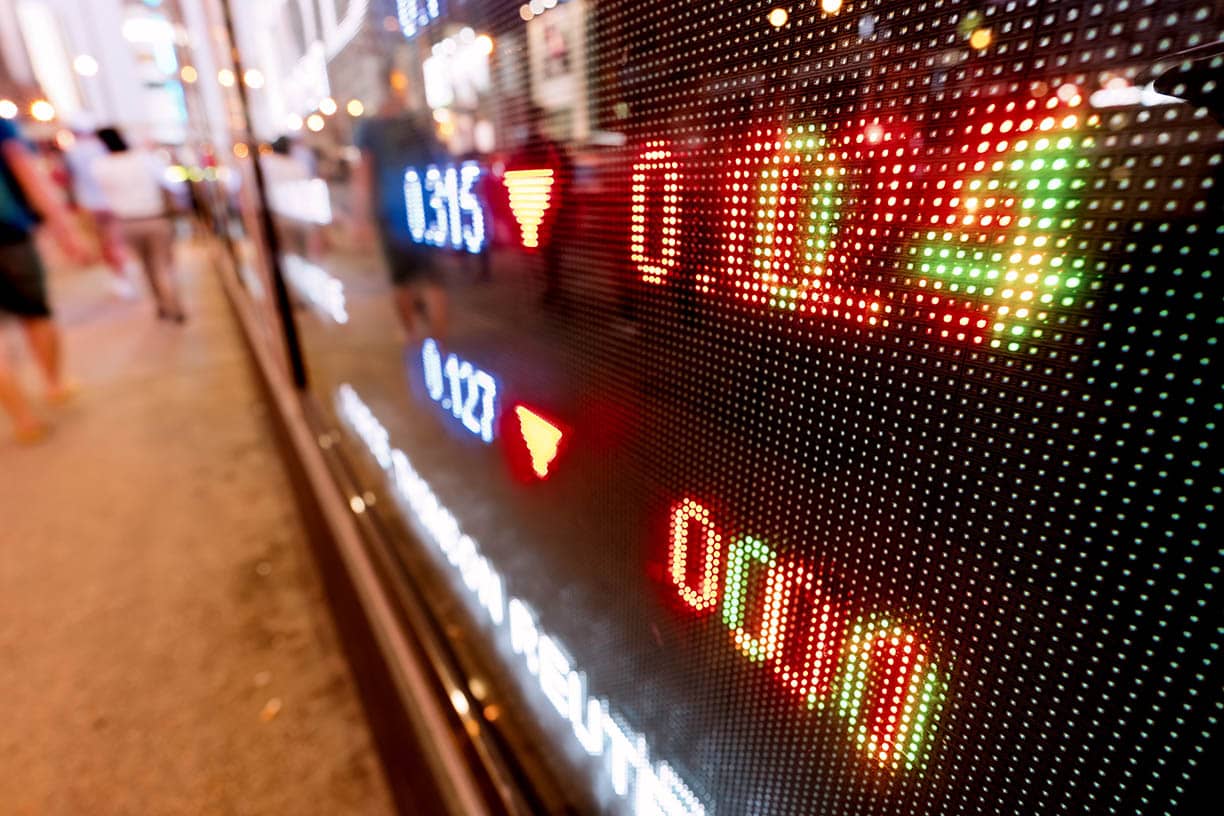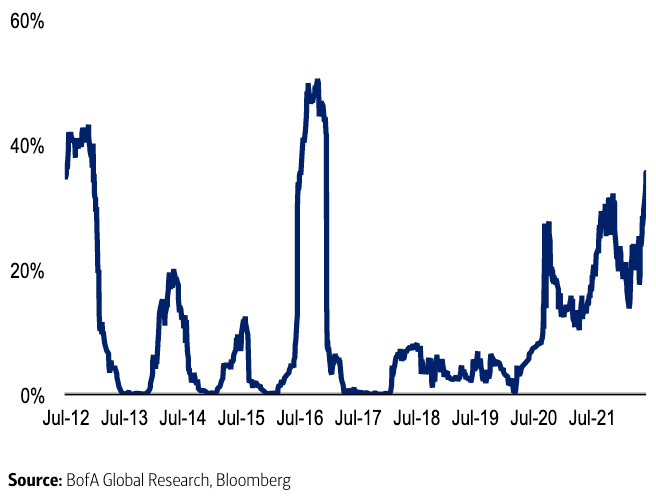Pound Sterling Outlook: Equity Market to Determine Direction against Euro and Dollar Near-term
- Written by: Gary Howes
- GBP increasingly correlated with stocks
- GBP would benefit when markets recover
- But further 10% decline in stocks possible says MUFG
- Correlates with GBP/USD as low as 1.17

Image © Adobe Images
With the data and event calendar in the UK falling empty this week the British Pound will take its cue from global investor trends, benefiting from any uptick in stock markets.
Ongoing volatility in global equity markets therefore delivers a mixed performance for Sterling with a firm start to stock market trade on Tuesday soon giving way to another sell-off driven by fears linked to surging natural gas prices.
Triggering another bout of nerves was news the Yamal-Europe pipeline has been shut by Europe, squeezing supply yet further.
German gas transportation operator Gascade said exit flows at the Mallnow metering point on the German border dropped to zero after earlier flowing at 2,190,136 kilowatt-hours per hour (kWh/h), the data showed.
The Yamal shutoff comes a day after gas prices spiked on news of industrial action due to take place in Norwegian gas fields and suggests Russian President Vladimir Putin has reacted to conditions that will allow him to hurt European countries hardest.
The Pound to Euro exchange rate rose by two thirds of a percent at one stage to 1.17 before fading back to 1.1650, taking international payment rates at high-street banks to ~1.1280 and those of payment specialists to ~1.1570.
The Pound to Dollar exchange rate had rallied to 1.2154 before pulling back to just below 1.20, meaning high-street bank rates on GBP/USD are seen at ~1.1660 and payment specialist rates at ~1.1960.
The Pound remains a 'high beta' pro-cyclical currency that tends to benefit when markets are rising but fall during protracted market downturns, as is the case in the current bear market.
In fact, analysis from Bank of America shows the Pound's responsiveness to global investor sentiment has risen notably since Covid.
"A currency is referred to as 'high-beta' if it is sensitive to global risk appetite," says Kamal Sharma, currency strategist at Bank of America. "GBP's sensitivity to world equity market has risen... about 35% of the currency's fluctuation can be explained by changes to the equity index".
Above: "6m rolling r-squared for regressing GBPUSD return vs MSCI World Equity Index return. GBP's sensitivity to risk asset has been rising post-Covid" - BofA.
Global stock markets have fallen over the course of 2022 amidst surging inflation levels that not only lowers the propensity for consumers to spend money, but also presses the world's central banks into raising interest rates.
Higher interest rates in turn lift the cost of finance and slow global economic activity.
Surging gas prices in the UK and Eurozone are meanwhile proving particularly troublesome for growth in the region, in turn encouraging investors to shun the Pound and Euro in favour of the Dollar.
"We see persistent near-term headwinds for GBP from increasing global and domestic recession fears, as our analysis screens GBP with relatively high beta to risk sentiment within the G10 space," says Barclays in a weekly currency strategy note. (Set your FX rate alert here).
Given the Pound's sensitivity to global market sentiment, an extension of broader market losses would inevitably induce further downside pressures.
But any recovery in the market would potentially underscore the currency, as is being seen at the start of the July's first full week.
Compare Currency Exchange Rates
Find out how much you could save on your international transfer
Estimated saving compared to high street banks:
£2,500.00
Free • No obligation • Takes 2 minutes
Equity markets however remain vulnerable in the current environment and the technical bear market that was confirmed in many major indices in June will likely be respected.
"The slide in equities resumed last week, with the S&P 500 down 2.2% amid renewed concerns over central bank tightening and the impact of elevated inflation on consumer sentiment. The decline left the S&P 500 20.6% lower year-to-date to 30 June, the worst first half of the year since 1970," says Mark Haefele, Chief Investment Officer, UBS Global Wealth Management.
Derek Halpenny, Head of research, Global Markets EMEA and International Securities says in a client note the Pound is trading much more tightly with stock performances.
"With the near-term outlook for global stocks not favourable through this quarter in our view, the prospects for the pound are not good," says Halpenny.
MUFG analysts hold a "plausible scenario that stocks could drop another 10% from here".
Translated into Pound Sterling performance - based on the current GBP TWI / FTSE 250 correlations covering the period since the Brexit referendum - MUFG says GBP/USD could drop to around 1.1700 and EUR/GBP rising to close to 0.8700.
EUR/GBP at 0.8700 gives a GBP/EUR exchange rate of 1.15.
Compare Currency Exchange Rates
Find out how much you could save on your international transfer
Estimated saving compared to high street banks:
£2,500.00
Free • No obligation • Takes 2 minutes





